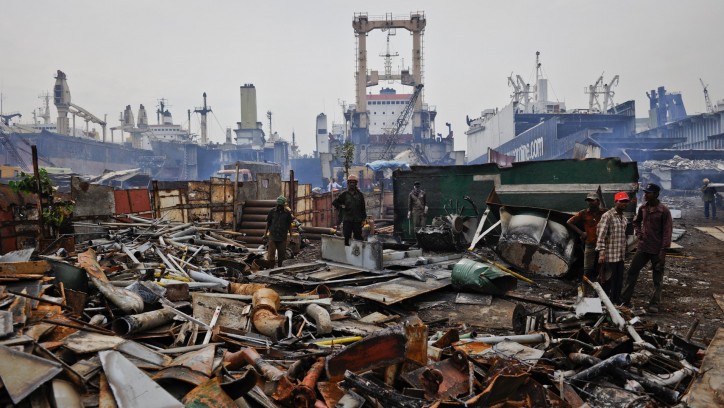Denmark’s Maersk Line, the world’s largest container shipping company, will send more decommissioned vessels to shipping yards in Alang for recycling at competitive prices and without harming the environment, according to a senior official.
“Our objective is to recycle our vessels in the responsible way and at the same time at a competitive price,” said Annette Stube, Head of Sustainability, Maersk Group.
“This shows why we came from China and Turkey and why we are not going to Bangladesh and Pakistan (where standards are very poor). We have seen development in India where four yards have started operating at far superior levels,” she said.
“We are coming to India as it gives us an opportunity to push development in the local ship recycling industry,” she added.

Improving standards
The company is working with ship breakers as well as Gujarat Maritime Board (GMB) to improve the standards and working environment at Asia’s biggest ship breaking yard.
Maersk Lines is expected to retire about 30 vessels in a few years with most of them headed here.
The company, which operates a fleet of over 600 large container vessels, has been recycling its vessels in China and Turkey. But now it has decided to look at India as an alternate destination as well as for financial reasons.
The company has already sent two vessels — Maersk Wyoming and Maersk Georgia — to Shree Ram Vessel Scrap Pvt. Ltd. for dismantling after extensive audit of its facilities.
“We foresee that many more vessels will come to Alang in the next five years as will need to recycle more vessels than before,” Ms. Stube said.
Shree Ram, which has four yards at Alang, is upgrading them to Maersk’s standards. Another recycler, Y.S. Investments, which has upgraded its yard and labour practices, is expecting to receive a Maersk vessel shortly.
‘Responsible place’
“Our vision for Alang is that it becomes a responsible place to recycle vessels. This will help the yard owners and the entire area,” Ms Stube said.
Maersk is helping local ship breakers to achieve high standards as per the International Maritime Organisation and Hong Kong Convention (HKC) which set occupational health and safety standards for workers.
Shree Ram’s workers get minimum wage of Rs.260 while gas cutters working on ships earn Rs. 375 a day. They work for eight hours a day and get 200 per cent overtime payment.
They are housed in dormitory facility and are trained to handle hazardous substances, including asbestos and chemical waste which is sent to GMB’s waste management facility.
“I have been working here for five years and earn Rs.325 for eight hours work. I am happy to have a better working condition,” said Avdesh Kumar Sulka (35), a gas cutter at Shree Ram who hails from Uttar Pradesh.
Shree Ram has extended the impermeable floor which has resulted in the reduction of intertidal zone by 60 percent thus ensuing handling of scrap and oily parts on a concrete floor untouched by sea water.
In 2015, out of the total 768 ships recycled globally, 469 vessels — representing 74 per cent of the total gross tonnage scrapped — were sold to ship breaking yards on beaches in India, Pakistan and Bangladesh where working and environmental conditions are questionable. Alang gets 35 per cent all ships scrapped globally.
Better place
Though considered a graveyard of ships and known for causing environmental hazards for decades, Alang is changing for the better. GMB has fixed guidelines for disposal of hazardous substances and provides mandatory safety training to workers.
Doctors at the local Red Cross Hospital report that the rate of fatal accidents has come down drastically.
“There has been a sharp decline in fatal accidents. Out of 90 patients who come here per day, three or four patients come with finger or burn injury,” said Dr. Raghavbhai Lakhani, the head of Red Cross Hospital, Alang.
According to local residents the number of fatalities has come down to four or five for the last three years from to 10 to 14 previously. This year, till now, one worker had lost his life.
Migrant workers from Bengal, Bihar, Odisha and Jharkhand stay in slums close to the yards. Maersk is working with the yards and GMB to improve housing facilities. GMB had already constructed houses for 1,000 workers.
Changing scenario
“I am very thankful to Maersk Line that they have started their journey from Alang with us,” said Chetan Patel, Director, Shree Ram Vessels Scrap.
“After Maersk’s ships arrived at Shree Ram, the scenario is changing. Several ship breakers are gearing up improve their yards to work with responsible shipping lines,” he added.
Maersk said it would work only with yards that have strong anti-corruption norms and follow high standards of labour practices and human rights. The yards must adhere to the norms on intertidal zones and have a facility for downstream waste management.
The ship breaker must have an impermeable floor and provide constant safety training. It should also provide insurance cover and provident fund for workers besides a dormitory facility.
Maersk is also enforcing attendance management system for all workers besides facilitating annual health check-up. It is also ensuring a workers’ committee is formed at the facility in the absence of a workers’ union. The yard must issue formal appointment letter and pay slips for all employees as per Maersk’s policy.
The company has stationed its personnel at Shree Ram’s facility to ensure that its standards are implemented.
Positive feedback
“We are here for the long haul. The collaboration with Shree Ram has been very good. They have exceeded our expectations. We are looking at working with more recyclers,” said Captain Prashant S.Widge, Head of Ship Recycling Group Sustainability, Maersk Group.
Alang has about 170 ship breaking yards out of which 80 to 100 are functional. Now several of them are working to achieve superior standards.
Source: The Hindu